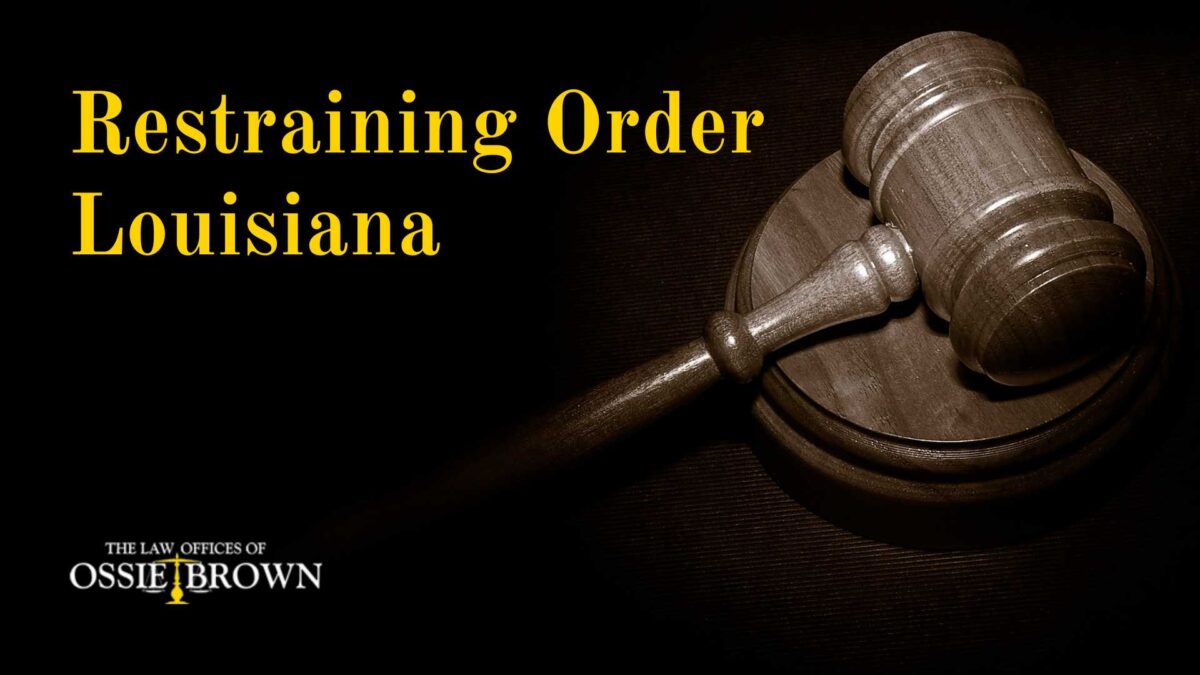At The Law Offices of Ossie Brown, we offer comprehensive legal services in both criminal defense and family law, particularly when it comes to matters involving restraining orders in Louisiana.
For those seeking protection from domestic abuse, obtaining a temporary restraining order (TRO) or protective order is a crucial step before or during a threatening divorce proceeding. Our experienced Baton Rouge family law attorneys assist clients in filing for a temporary restraining order to ensure all legal safety measures are in place where there is a present danger of abuse. Emergency temporary restraining orders are typically sought to prevent domestic abuse (cases involving a sexual or intimate relationship) and cases involving present danger of abuse for minor children.
On the criminal defense side, our Baton Rouge domestic violence lawyers vigorously defend individuals accused of violating restraining orders, understanding the severe legal consequences such charges entail. Our domestic abuse lawyers are skilled at challenging the evidence that domestic abuse occurred and protecting our clients’ rights, whether the accusation involves breaching a temporary restraining order or a more permanent protective order.
Balancing both aspects, our law firm is dedicated to providing robust defense while also advocating for those seeking protection from domestic abuse or child abuse, ensuring a fair and just legal process for all involved.
For any help with a Louisiana restraining order, call The Law Offices of Ossie Brown at 225-343-1111 to schedule a free initial consultation.
What is a Restraining Order in Louisiana?
A restraining order in Louisiana is a court order issued to protect individuals from harassment, abuse, or threats. Restraining orders mandate that the restrained person cease contact with the person on whose behalf the restraining order or protective order was filed. Protective orders may include provisions such as staying a certain distance from the petitioner, their home, workplace, or school. In Louisiana, restraining orders can be issued by family court, criminal court, civil court, or juvenile court.
Like many states, Louisiana has a statewide registry known as the Louisiana Protective Order Registry. The Louisiana Protective Order Registry catalogs protective orders issued to prevent family, dating, and domestic violence and sexual abuse, ensuring a Louisiana law enforcement officer can enforce the restraining orders effectively. While any person can request that the court issue a protection order restraining another person, only those orders that are issued to prevent domestic abuse, stalking, dating violence, or sexual assault are included in the Louisiana Protective Order Registry.
Once the decision is made to grant a temporary restraining order (TRO), the judge will have prepared a Uniform Abuse Prevention Order, will sign the temporary restraining order, and will immediately forward the restraining order to the court clerk for filing the protection order on the day it is issued. Once issued, the chief law enforcement officer will receive a copy of the temporary restraining order by the following business day from the court clerk.
In Louisiana, individuals who have a relationship with the abuser can file a temporary restraining order and are not only limited to a family member, adult household member or someone they were in a sexual or intimate relationship with.
Below are the individuals with the same protections and eligibility to file for restraining orders in Louisiana.
- Dating Partner: Someone who is or was previously involved in a sexual or intimate relationship with the abuser (alleged), regardless of whether they were an adult household member.
- Household Member: An individual who lived with the alleged abuser and was in a sexual or intimate relationship with them. This includes any adult household member or minor children who lived in the same house as the alleged abuser.
- Family Member: The following are considered a family member under Louisiana law.
- Parent, step-parent, foster parent;
- Spouse or former spouse;
- Child, step-child, foster child;
- Grandchildren, great-grandchildren;
- Grandparents, great-grandparents;
- Other parent of the alleged abuser’s child;
- Other foster parent of the alleged abuser’s foster child
What Proof Do You Need For a Restraining Order in Louisiana?
Exactly what proof do you need for a restraining order in Louisiana?
To obtain a restraining order in Louisiana, the person seeking protection must provide sufficient evidence to demonstrate that they are in immediate danger of abuse, harassment, or threats. This evidence can include police reports, medical records, photographs of injuries, and any written communications such as emails, text messages, or social media posts that document the abuse or threats.
Witness statements from those who were there when abuse occurred can also be crucial. The criminal court or family court will review this evidence to determine whether there is a credible threat to your safety, which justifies the issuance of a restraining order.
The court assesses this evidence to determine whether there is a reasonable fear of harm that justifies the issuance of a protective order. The specific nature and extent of the required evidence can vary based on the circumstances, but the primary goal is to demonstrate a credible threat to the safety of the person on whose behalf the temporary restraining order is sought.
What are the Laws Regarding Louisiana Protective Orders
In Louisiana, protective orders provide the same protections to individuals who are victims of domestic abuse, stalking, sexual assault, or other forms of harassment. Protective orders can include temporary restraining orders (TROs) and more permanent protective orders, each serving to restrict the alleged abuser’s actions and contact with the person who filed the restraining order.
Emergency Temporary Restraining Order for Immediate and Present Danger
An emergency temporary restraining order in Louisiana is designed to provide immediate protection for individuals facing immediate and present danger of abuse, harassment, or threats. Issued ex parte, meaning without the abuser present, an emergency temporary restraining order is based on the petitioner’s sworn testimony and any available evidence demonstrating the risk of immediate danger.
Emergency temporary restraining orders offer fast and urgent protection and can be issued outside of regular court hours. The emergency temporary restraining order lasts until a full court hearing can be held and final order given, usually within 21 days.
During this period, the emergency temporary restraining order can enforce various safety measures, such as prohibiting contact, ordering the alleged abuser to stay away from specific locations, and any other necessary provisions to ensure the safety of the petitioner or the minor child.
Protective Order
A protective order (PO) in Louisiana provides long-term protection for individuals who have experienced domestic violence, stalking, sexual assault, or harassment under statutes such as the following.
- Louisiana Domestic Abuse Assistance Act: The Domestic Abuse Assistance Act provides provisions for obtaining protective orders for victims of domestic abuse in Louisiana. The Domestic Abuse Assistance Act outlines the criteria for issuing restraining orders and provides resources for victims seeking protection against domestic violence. Under this act, abuse of by an adult child against his or her parent or grandparent applies.
- Protection from Stalking Act: This offers legal recourse for individuals who are victims of stalking in Louisiana. The Protection from Stalking Act allows victims to seek restraining orders against their stalkers, providing immediate protection and remedies to prevent further harassment or intimidation.
- Protection for Victims of Sexual Assault Act: This act addresses the needs of victims of sexual assault in Louisiana and provides mechanisms for obtaining restraining orders against perpetrators. The Victims of Sexual Assault Act recognizes the unique vulnerabilities of sexual assault survivors and offers ways to secure a legal protection order to ensure their safety and well-being.
- Protection from Dating Violence Act: The Protection from Dating Violence Act extends legal protections to victims of dating violence in Louisiana. The Dating Violence Act enables individuals in a dating relationship with the abuser to seek restraining orders against their alleged abusers, ensuring that they have the same protections as victims of domestic abuse.
- Children’s Code Domestic Abuse Assistance Act: This act provides provisions for obtaining restraining orders to safeguard a minor child from abusive situations and ensures that the best interests of minor children are prioritized in legal proceedings associated with household member violence.
To obtain a protective order, the petitioner must attend a full court hearing where both they and the alleged abuser can present evidence during the court hearing. If the judge determines that there is sufficient evidence of abuse or threat, a protective order restraining the offender is issued.
This court order can last up to 18 months. It may include various provisions, such as prohibiting the abuser from contacting the victim, requiring the abuser to stay away from the victim’s home, workplace, or school, and mandating the surrender of any firearms. Sometimes, the court order can be extended if the threat persists.
Injunctions Against Domestic Abuse
In Louisiana, injunctions against domestic abuse serve as legal tools to prevent domestic abuse within the state. These injunctions, commonly known as protective orders or restraining orders, are sought by victims to protect themselves and their minor children from further harm. Those seeking assistance can file during divorce proceedings or independently through the civil court system. Once granted, these orders often include provisions for temporary custody of children. The court sets a hearing date to determine whether a permanent restraining order should be issued. If granted, the permanent restraining order establishes clear boundaries and protections.
When individuals subject to a protective order fails to comply with the court order, they can be held in civil contempt. Civil contempt attempts to ensure compliance with the protective order, restraining effectively the accused. Contempt proceedings may result in penalties such as fines and court costs, community service, or imprisonment until the individual complies with the court’s orders. Understanding the implications of civil contempt is essential for all parties involved in domestic violence cases, including victims, perpetrators, and their legal representatives.
Criminal Orders of Protection
In Louisiana, criminal orders of protection are issued in criminal court against an individual accused of committing abusive or violent acts. Criminal protective orders are usually granted when the accused is arrested or charged with crimes involving domestic violence, stalking, harassment, or sexual assault.
As previously mentioned, the protective order can include provisions such as prohibiting the accused from contacting the alleged victim, mandating a specified distance to be maintained from the victim’s home, workplace, or school, and requiring the surrender of any firearms.
Violating a criminal order of protection is a serious offense that can result in additional criminal charges.
Restraining Order Violation in Louisiana
In Baton Rouge, Louisiana, restraining order violations represent serious legal offenses with potential consequences for those who breach a protective order. When individuals subject to protective orders, commonly referred to as restraining orders, breach the terms of the court order, whether this is family court or criminal court, they could face legal repercussions.
Violating any part of this court order, whether it be a temporary restraining order (TRO) or final protective order, can result in arrest, fines, and imprisonment. This section provides an overview of what constitutes a protective order violation and the potential penalties involved.
What Constitutes a Protective Order Violation in Louisiana?
In Louisiana, a protective order violation occurs when an individual subject to a court-issued protective order (also known as a restraining order or protection order) breaches the terms outlined within the court order. Protective order violations encompass various actions prohibited by the court, such as contacting the protected party, approaching their residence or workplace, or engaging in any behavior explicitly restricted by the order. This applies to only those orders issued within the state of Louisiana, though similar consequences may apply to out-of-state orders recognized by Louisiana courts.
Penalties for a Louisiana Restraining Order Violation
Violating a restraining order can lead to a court hearing with a new court date in either criminal court or family court, depending on the nature and severity of the restraining order violation. Consequences for protection order violations may include civil contempt charges, criminal charges, or both, potentially resulting in penalties such as fines, probation, or imprisonment.
Additionally, protective order violations can extend beyond interpersonal interactions to include breaches related to personal property or other assets outlined within the protective orders.
Many individuals who have been arrested on criminal charges have the opportunity to post bail while they await their new hearing date. As of 2017, the passing of Gwen’s Law in Louisiana made it more difficult for offenders arrested on domestic abuse charges. Before granting bail, judges will consider several factors, including criminal history and the accused’s level of threat to the alleged victim. Depending on the judge’s findings, the accused can either be released on bail or must remain in jail until the court hearing date.
If you’ve been arrested for violating a restraining order, working with an experienced experienced Baton Rouge criminal defense attorney can ensure that your legal rights are upheld.
First Offense Violation of Restraining Order in Louisiana
Under Louisiana law, a first-time restraining order violation can result in misdemeanor criminal charges. If convicted, an offender of violations for the court order restraining them can receive a six-month jail sentence and/or be required to pay fines of up to $500. If the restraining order violation involves physical harm, the offender will be charged with a felony.
Subsequent Offenses for Violation of a Restraining Order in Louisiana
Second and subsequent offenses for violating a restraining order in Louisiana are met with increasingly severe penalties. Repeat violations of restraining orders can result in felony charges punishable by 14 days to two years in prison and up to $1,000 in fines. The 14 days are served without the benefit of probation, parole, or suspension of sentence.
Second and subsequent offenses of protective order violations where violence or abuse occurred are punishable by three months to two years in prison and up to $1,000 in fines. The first 30 days are served without the benefit of probation, parole, or suspension of sentence.
Offenders convicted of second or subsequent offenses involving restraining order violations will be required to participate in a court-monitored domestic abuse intervention program.
What Happens if the Victim Violates the Order in Louisiana?
While restraining orders are primarily designed to protect victims immediately, any violation of a protection order by the victim can potentially impact the order’s enforcement and effectiveness. For instance, if the victim initiates contact with the restrained person or fails to adhere to the provisions set by the protective order, it may complicate the situation and affect the legal proceedings.
How to Beat a False Restraining Order in Baton Rouge, Louisiana
At The Law Offices of Ossie Brown, our Baton Rouge restraining order lawyer group understands the severe implications a false restraining order can have on your life and is committed to providing the robust defense necessary to protect your legal rights. Our experienced criminal defense attorneys will investigate the circumstances surrounding the restraining orders, gather evidence, and present a compelling case to challenge the protective order restraining you without cause.
Our Baton Rouge domestic violence attorneys can also help answer the question, “Can you drop domestic violence charges in Louisiana?” While this decision ultimately rests with the prosecutor, it’s still crucial to have an experienced criminal defense attorney representing you to help you obtain the best outcome from the charges.
If you’re facing a false restraining order, need guidance on domestic violence charges, or need to file for a restraining order in Baton Rouge, trust The Law Offices of Ossie Brown to advocate for you with expertise and compassion, ensuring your voice is heard, and your rights are defended. Call 225-343-1111 to schedule a free initial consultation with one of our seasoned attorneys today.




